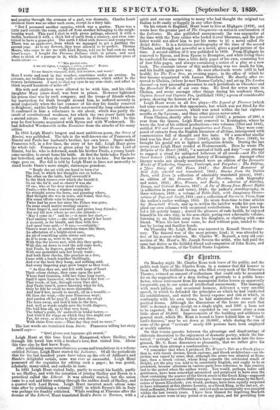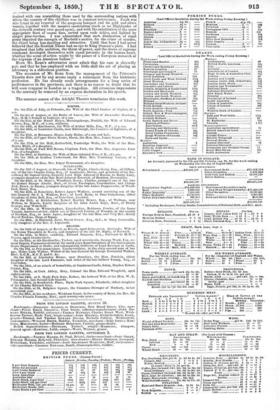t Ontrtz.
On Monday night Mr. Charles Kean took leave of the public, and the public took leave of Mr. Charles Kean, in a manner that did honour to them both. The brilliant throng, who filled every nook of the Princess's Theatre, evinced an amount of enthusiasm that could only be accounted for on the supposition of a deep feeling of gratitude to a public bene- factor, whose retirement from his managerial duties leaves an apparently irreparable gap in our series of intellectual amusements. The manager, with much pathos, and occasional humour, delivered a very sensible speech, in which he defended the principles on which he had conducted his establishment, and stated the heavy expense and risk at which, in conformity with his own views, he had maintained the cause of the poetical drama. Although the dimensions of the house are such that 2001. is deemed a large receipt on a single night, and 2501. a boon not to be expected, Mr. C. Kean has expended in one season alone a sum little short of 50,000/. Improvements of the building and additions to general stock, which Mr. Kean is bound to leave behind him as " land- lord's fixtures," may be set down at 10,000/., while during the run of some of the great " revivals" nearly 550 persons have been employed at weekly salaries.
On that vexata qurestio between the advantage and disadvantage of elaborate decoration to the enjoyment of dramatic poetry, which the his- torical " revivals" at the Princess's have brought so much into the fore- ground, Mr. C. Kean discourses so pleasantly, that we rather give his own words than attempt a condensation :—
" I remember that when I produced The Winter's Tale as a Greek play— that is, with Greek dresses, Greek customs, and Greek architecture—an ob- jection was raised by some, that, although the scene was situated at Syra- cuse, then a Greek colony, whose King consults the celebrated oracle of Delphi, yet the play was said to be essentially English, and ought to be so presented, because allusions in various parts bore reference to this country and to the period when the author wrote. You would, perhaps, ladies and gentlemen, have been somewhat astonished and perplexed to have seen the chest containing the answer of the Greek oracle to the Greek King—supposed to havebeen delivered above 2000 years ago—borne upon the stage by the Beef- eaters of Queen Elizabeth ; you would, perhaps, have been equally surprised to have witnessed at this theatre Leontes, as a Greek King, in the fast act, at- tired as Hamlet, Prince of Denmark ; and yet such an incongruity was accepted within the last twenty years. I have been blamed for depriving Macbeth of a dress never worn at any period or in any place, and for providing him instead with one resembling those used by the surrounding nations with whom the country of this chieftain was in constant intercourse. Fault was also found in my removal of the gorgeous banquet end its gold and silver vessels, together with the massive candelabras (such as no Highlander of the eleventh century ever gazed upon), and with the substitution of the more appropriate feast of coarse fare, served upon rude tables, and lighted by simple pine-torches. I was admonished that such diminution of regal pomp impaired the strength of Macbeth's motive for the crime of murder, the object being less dazzling and attractive. Until that hour I had never believed that the Scottish Thane had an eye to King Duncan's plate. I had imagined that lofty ambition, the thirst of power, and the desire of supreme command developed themselves with equal intensity in the human heart, whether the scene of action might be the palace of a European monarch or the wigwam of an American Indian."
Even Mr. Kean's adversaries must admit that his case is shrewdly put, and that he has employed with no little skill the art of placing an adversary in a ridiculous position. The secession of Mr. Kean from the management of the Princess's Theatre does not by any means imply a retirement from the histrionic profession. He has already made arrangements for a long series of performances in the provinces, and there is no reason to doubt that he will soon reappear in London as a tragedian. All erroneous impressions to the contrary he removed by an express declaration in his speech.



























 Previous page
Previous page